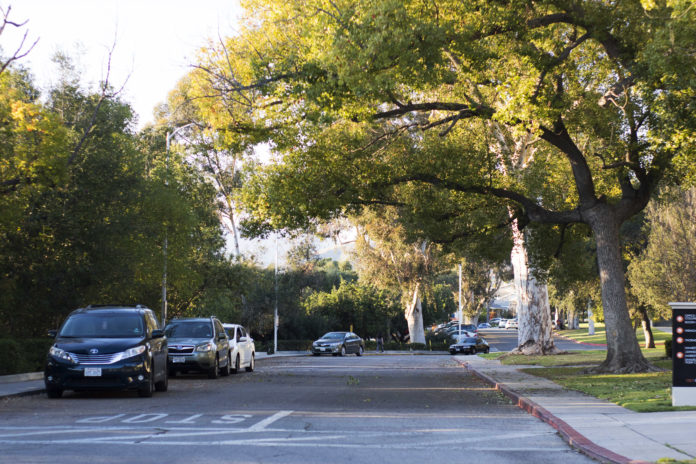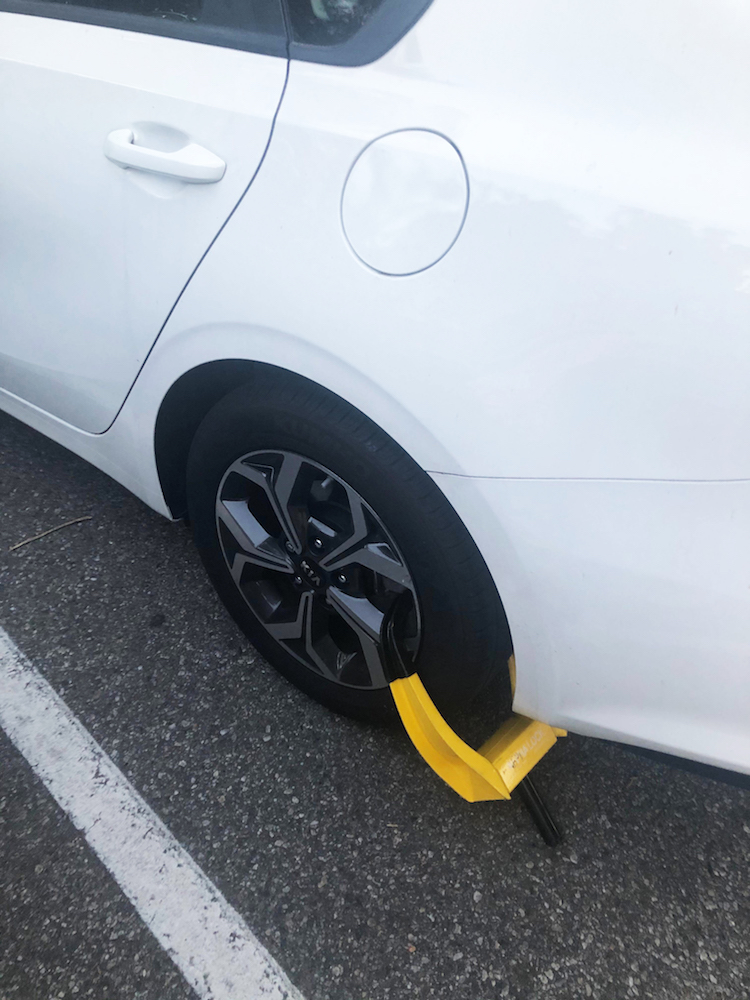
Campus Safety began increasing the amount of parking boots used on cars whose drivers have parking violations January 2020 in an initiative to address unregistered cars parking in designated faculty lots. Campus Safety officers implement the boots themselves, which immobilize a vehicle until Campus Safety is contacted to have them removed. According to Director of Campus Safety Rick Tanksley, the number of boots deployed rose from four total in 2018 and 2019 to 17 in 2020 as of Feb. 25.
“Campus Safety routinely receives complaints from faculty and staff that students are parking where they shouldn’t be parking, and that leaves them no space to park in those areas which are designated for faculty and staff only,” Tanksley said.

When unregistered cars accumulate more than $1,000 worth of tickets, Tanksley said, Campus Safety has resorted to booting cars as a way to get students into the office to register their cars. The authority for Campus Safety to boot cars with over three tickets has existed at least since Tanksley arrived on campus in January 2018, Tanksley said, but the number of boots implemented has significantly increased this semester alone.
“Campus Safety should know who each vehicle belongs to on campus, whether it’s staff, faculty, students, vendors. It’s even stated on the college’s website,” Tanksley said. “The last thing we want to do is ticket vehicles. In many cases, we would send out an email when we knew who the vehicle belonged to.”
Because Campus Safety does not have the ability to run plates like the LA Police Department or LA City Department of Transportation, registration is the only way Campus Safety can know whose car is whose on campus, according to Tanksley.
“It’s not a punishment. We need to know who are you and why isn’t this vehicle permitted? If we had your permit, we could send you an email,” Tanksley said.
Registration for parking on campus is free for students, faculty, staff and visitors, according to Tanksley. Late fees can double or triple the amount owed per ticket if someone does not meet the payment deadline stated on the ticket, according to Tanksley.
The money collected from fees is not directed into the Campus Safety budget, Tanksley said, but is equivalent to a library fine, and is paid for by student accounts.
Tanksley said when cars are booted, it is not intended as a punishment, but as a way to incentivize students to register their cars.
“Our protocol is we take the boot off immediately, but you have to come in right now to obtain a permit,” Tanksley said. “We had to get people’s attention.”
Rachel Winningham (senior) said she was on her way to her first day of a new babysitting job Feb. 14 when she arrived at her car to find a boot on her wheel.
“If I had not had a roommate who had a car or I was unable to use her car, I definitely would have lost that babysitting job,” Winningham said. “When I saw it, I was like, ‘Okay, that’s fair.’ I’ve gotten two parking tickets, and I had a feeling that it would come back to bite me eventually, but I felt like that was very extreme.”
No campus-wide announcement was sent out to announce the initiative to increase boots for unregistered cars parking in designated spots. A sign was posted in early February in the lot between Emmons Wellness Center and Haines Hall, reserved for administrative parking, specifying that “unauthorized vehicles will be ticketed/booted at owner’s expense.”
Tanksley said he rarely has students pay the full amount of fines they owe once their cars are booted.
“They come in and they talk to us and I have used my authority to reduce these fines,” Tanksley said. “I just want your vehicle registered. I’m not trying to punish you. Because I know that’s money that a lot of people don’t have — either a lot of students or a lot of parents don’t have. But I do need to bring some order to this parking on campus.”
According to Tanksley, many students register their cars through the online registration system, but never pick them up. A stack of uncollected parking passes fills a large binder in the Campus Safety office. Evan Sarafian (senior) did not register his car his sophomore and junior year after registering it his first year.
“I never re-registered because I was too lazy to walk over to Campus Safety. I got a ticket in Berkus garage for having an expired parking registration pass,” Sarafian said. “It was sad because it was at 4 a.m. and I was like, ‘Why are you ticketing me at 4 a.m.? Go sleep.'”
Tanksley said he suggests students park on upper campus if they are unable to find a spot in one of the lower lots. According to Winningham, the spots in those lots are often full, especially at night.
“I lived in Norris as a sophomore, and there was not ample spots up there even then,” Winningham said. “I cannot even imagine how few there must be now.”
Winningham said she wished she would have received a warning before Campus Safety resorted to booting her car.
“I would have done anything to avoid that because, like I said, it was really scary. And I almost lost that job. I had to sprint home — I literally was panting by the time I got home,” Winningham said.
![]()



































